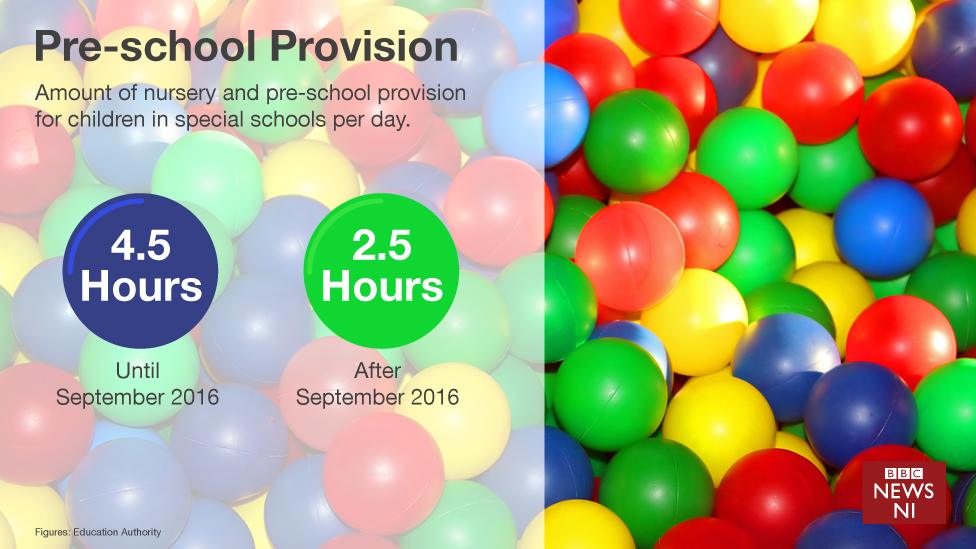Special needs: Nursery hours for children to be cut
- Published
Laura Callighan is a nursery teacher at Tor Bank Special School in Belfast where the changes have already come into effect
The amount of nursery and pre-school provision for children in special schools is to be reduced.
The move will come into effect in September and will affect all 39 special schools in Northern Ireland.
It will mean pre-school children with moderate to severe learning difficulties will attend school for 2.5 hours instead of at least 4.5 hours a day.
The cut was revealed by the Education Authority (EA) in a letter to a parent.
It confirms that from September 2016 "all pre-school children will receive 2.5 hours in pre-school per day".
The EA said the move "is designed to increase the opportunity for children to access special school places," and will provide "greater regional consistency".

However, a body that represents special school principals and governors said the cut will "hold back and restrict the development of children with complex needs".
In a submission to the Northern Ireland Assembly, the Strategic Leadership Forum for Special Schools (SLFSS) said they "totally disagree" with the move.
They said it will have a range of impacts including:
A limited time to deliver any planned education activities after a pupils "medical and complex needs" and other needs including "nappy changes" are addressed.
Less time to help children exhibiting "severe to challenging behaviour".
No time to help children learn feeding skills, as under the new model "children are unable to stay for lunch".
Restricting delivery of speech language therapy, physiotherapy and occupational therapy to children.
Francine Wilson's three-year-old son Aodhan, is due to start pre-school at a special school in September.
"Aodhan has Down's Syndrome and we were hoping in September 2016 he would get five hours of nursery placement," she said.
BBC News NI Education Correspondent Robbie Meredith spoke to Tor Bank School, to find out how the reduction will affect them
"Receiving two and a half hours will, I believe, result in delayed development in Aodhan, both educationally and socially."

Children with moderate to severe learning difficulties will attend pre-school for 2.5 hours instead of at least 4.5 hours a day.
However, a spokesperson for the EA said the reduction was "in line with the Department of Education's 'Learning to Learn' policy".
"There has been a progressive move towards part-time places in all sectors," the spokesperson said.
"This policy recognises the research evidence that there is no discernible difference in children's development at the start of primary school between those who received part-time and full-time pre-school provision.
"This move is designed to increase the opportunity for children to access special school places, preferably nearer to their homes."
"The provision of increased access and greater regional consistency is a priority," they added.
- Published17 February 2016

- Published26 November 2015

- Published1 June 2015
